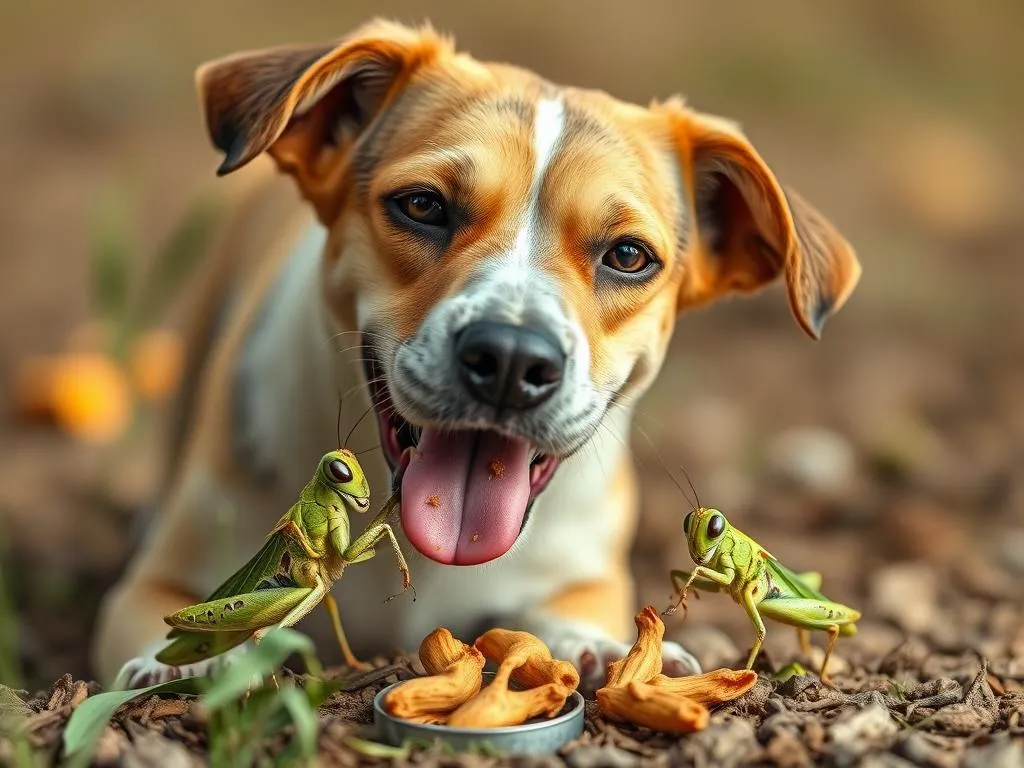
Introduction
Dog nutrition is a vital aspect of ensuring the overall health and well-being of our furry companions. Just like humans, dogs require a balanced diet to thrive, affecting their energy levels, coat quality, and longevity. Amidst the various dietary options available, one curious question often arises: can dogs eat grasshoppers? This article aims to explore the safety and potential benefits of incorporating grasshoppers into a dog’s diet while providing a comprehensive understanding of dog nutrition.
Understanding Dog Nutrition
Importance of a Balanced Diet
A well-rounded diet for dogs consists of three primary macronutrients: proteins, fats, and carbohydrates. Each of these components plays a crucial role in a dog’s health:
- Proteins are essential for growth, maintenance, and repair of tissues. They also support the immune system and are vital for the production of hormones and enzymes.
- Fats are a concentrated source of energy and help in the absorption of fat-soluble vitamins (A, D, E, and K). They also contribute to healthy skin and coat.
- Carbohydrates provide energy and aid in digestion through fiber.
In addition to macronutrients, vitamins and minerals are essential for various bodily functions. A balanced diet supports a dog’s immune system, helps maintain a healthy weight, and contributes to a longer, healthier life.
Common Dietary Needs of Dogs
Dogs have unique dietary requirements that can vary based on factors such as age, breed, and health status. Puppies, for instance, need diets rich in protein to support their rapid growth, while older dogs may require lower-calorie options to manage their weight.
When considering a dog’s diet, pet owners often face the choice between commercial dog food and homemade diets. While commercial options are convenient and specially formulated to meet nutritional needs, homemade diets can offer customization based on individual dog preferences and dietary restrictions.
Exploring Grasshoppers as Food
Nutritional Profile of Grasshoppers
Grasshoppers are not only a common sight in backyards but are also rich in nutrients. They contain a high protein content—approximately 60-70% of their dry weight—and are low in fat. In addition, grasshoppers offer several essential vitamins and minerals, including:
- Vitamin B12
- Iron
- Magnesium
- Zinc
When comparing grasshoppers to other protein sources like chicken and beef, they stand out as a sustainable and nutrient-dense option. Their high protein and low fat content make them an attractive addition to a dog’s diet, particularly for dogs needing to maintain a healthy weight.
Cultural and Global Perspectives
In many cultures, particularly in parts of Asia, Africa, and Latin America, grasshoppers and other insects are considered delicacies. They are often consumed as snacks or added to dishes for their crunch and flavor. The practice of incorporating insects into diets is gaining popularity worldwide, highlighting the nutritional benefits they offer not just to humans but also to our pets.
Insects play a significant role in the diet of various animals, including birds, reptiles, and even some mammals. As such, the idea of dogs eating insects like grasshoppers is not as far-fetched as it may initially seem.
Can Dogs Eat Grasshoppers?
Safety Considerations
Before introducing any new food into a dog’s diet, it’s essential to consider safety. While can dogs eat grasshoppers is a valid question, there are potential risks involved. Grasshoppers may carry pesticides or other contaminants if not sourced properly. Additionally, some dogs may have allergies to certain insects, which can lead to adverse reactions.
Signs of allergic reactions or digestive issues in dogs can include:
- Vomiting
- Diarrhea
- Excessive itching
- Swelling or hives
If a dog experiences any of these symptoms after consuming grasshoppers, it’s crucial to consult a veterinarian promptly.
Benefits of Feeding Grasshoppers to Dogs
When sourced safely, grasshoppers can provide several benefits to dogs:
-
High Protein Content: Grasshoppers offer a protein source that is comparable to traditional meats, supporting muscle growth and overall health.
-
Low Fat: Their low-fat profile makes grasshoppers suitable for dogs that require weight management.
-
Gut Health: Insects like grasshoppers may promote a healthy gut microbiome, supporting digestion and nutrient absorption.
-
Sustainable Protein Source: With the increasing emphasis on sustainable food sources, incorporating insect protein can be an eco-friendly alternative.
How to Safely Introduce Grasshoppers
To introduce grasshoppers into a dog’s diet safely, follow these steps:
-
Choose High-Quality Sources: Ensure that the grasshoppers are sourced from reputable suppliers. Avoid wild-caught insects unless you are certain they are free from pesticides and contaminants.
-
Start Small: Begin with a small portion to gauge your dog’s reaction. Monitor for any signs of allergies or digestive discomfort.
-
Recommended Portion Sizes: Depending on your dog’s size, start with a few grasshoppers and adjust according to their tolerance. A few grasshoppers can be given as a treat or mixed into their regular food.
-
Frequency: Introduce grasshoppers as an occasional treat rather than a staple in their diet to maintain balance.
Alternative Insect Protein Sources
Other Edible Insects for Dogs
In addition to grasshoppers, several other insects are safe for dog consumption:
- Crickets: High in protein and low in fat, crickets are another excellent insect source for dogs.
- Mealworms: Rich in protein and omega-3 fatty acids, mealworms can contribute to a dog’s overall health.
Each of these insects offers unique nutritional benefits and can be incorporated into a dog’s diet, either as treats or as part of their regular meals.
Commercial Insect-Based Dog Foods
With the growing interest in insect protein, several commercial brands now offer dog foods that include insects as a primary protein source. These products often highlight the following pros and cons:
Pros:
- Nutritional density: Many insect-based dog foods are rich in protein and essential nutrients.
- Sustainability: Insect farming has a lower environmental impact than traditional livestock farming.
Cons:
- Cost: Insect-based dog food can be more expensive than conventional options.
- Acceptance: Some dogs may be hesitant to accept new food sources, requiring gradual introduction.
Potential Concerns and FAQs
Common Concerns from Dog Owners
Many dog owners may have reservations about feeding insects to their pets. Common misconceptions include worries about the safety and digestibility of insects. However, when sourced correctly, insects can be a safe and nutritious food option for dogs. Additionally, insect farming is generally considered more sustainable than traditional livestock farming, contributing positively to the environment.
Frequently Asked Questions
-
Can all dogs eat grasshoppers?
While many dogs can safely consume grasshoppers, it is essential to monitor for allergies and digestive issues. Always consult with a veterinarian before introducing any new food. -
What should I do if my dog eats a grasshopper?
If your dog consumes a grasshopper, observe them for any signs of distress. If they show symptoms of an allergic reaction or digestive discomfort, contact your veterinarian. -
Are there any dogs that should avoid eating insects?
Dogs with known allergies to insects or those with specific dietary restrictions should avoid insect proteins. Always consult with a veterinarian for personalized advice.
Conclusion
In summary, the question of can dogs eat grasshoppers leads to an exciting avenue in dog nutrition. Grasshoppers are a nutrient-dense food source that can provide high protein with low fat, making them a viable option for many dogs. However, it is crucial to consider safety and potential allergies before introducing them into a dog’s diet.
As always, dog owners should consult with their veterinarians before making any significant dietary changes, ensuring their pets receive the best nutrition possible. With the right approach, grasshoppers can be a healthy addition to your dog’s diet, promoting overall health and well-being.









